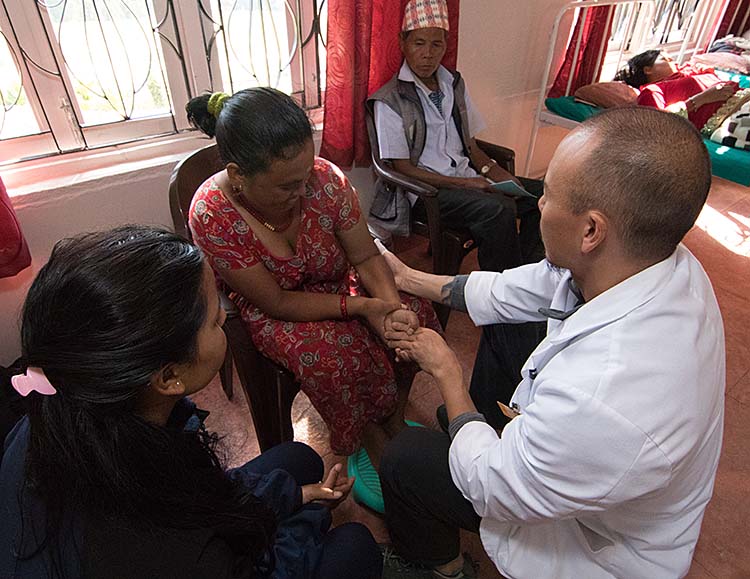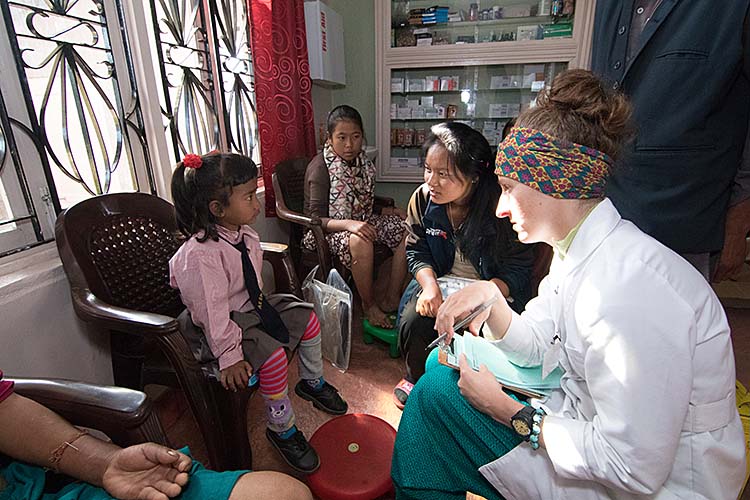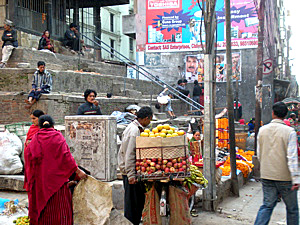Our Mission
Effective, Efficient Rural Primary Care
VOLUNTEER COMMUNITY CARE CLINICS IN NEPAL
Nepal remains one of the poorest countries in the world and has been plagued with political unrest and military conflict for the past decade. In 2015, a pair of major earthquakes devastated this small and fragile country.
Since 2008, the Acupuncture Relief Project has provided over 300,000 treatments to patients living in rural villages outside of Kathmandu Nepal. Our efforts include the treatment of patients living without access to modern medical care as well as people suffering from extreme poverty, substance abuse and social disfranchisement.
Common conditions include musculoskeletal pain, digestive pain, hypertension, diabetes, stroke rehabilitation, uterine prolapse, asthma, and recovery from tuberculosis treatment, typhoid fever, and surgery.
FEATURED CASE STUDIES
Rheumatoid Arthritis +

35-year-old female presents with multiple bilateral joint pain beginning 18 months previously and had received a diagnosis of…
Autism Spectrum Disorder +

20-year-old male patient presents with decreased mental capacity, which his mother states has been present since birth. He…
Spinal Trauma Sequelae with Osteoarthritis of Right Knee +
60-year-old female presents with spinal trauma sequela consisting of constant mid- to high grade pain and restricted flexion…
Chronic Vomiting +

80-year-old male presents with vomiting 20 minutes after each meal for 2 years. At the time of initial…
COMPASSION CONNECT : DOCUMENTARY SERIES

Episode 1
Rural Primary Care
In the aftermath of the 2015 Gorkha Earthquake, this episode explores the challenges of providing basic medical access for people living in rural areas.

Episode 2
Integrated Medicine
Acupuncture Relief Project tackles complicated medical cases through accurate assessment and the cooperation of both governmental and non-governmental agencies.

Episode 3
Working With The Government
Cooperation with the local government yields a unique opportunities to establish a new integrated medicine outpost in Bajra Barahi, Makawanpur, Nepal.

Episode 4
Case Management
Complicated medical cases require extraordinary effort. This episode follows 4-year-old Sushmita in her battle with tuberculosis.

Episode 5
Sober Recovery
Drug and alcohol abuse is a constant issue in both rural and urban areas of Nepal. Local customs and few treatment facilities prove difficult obstacles.

Episode 6
The Interpreters
Interpreters help make a critical connection between patients and practitioners. This episode explores the people that make our medicine possible and what it takes to do the job.

Episode 7
Future Doctors of Nepal
This episode looks at the people and the process of creating a new generation of Nepali rural health providers.

Compassion Connects
2012 Pilot Episode
In this 2011, documentary, Film-maker Tristan Stoch successfully illustrates many of the complexities of providing primary medical care in a third world environment.
From Our Blog
Community acupuncture is a powerful tool in rural and under-served settings—but for us, acupuncture is only one part of a broader primary care model.
At our Healthy Lifestyle Centers (HLCs) in Nepal, we do not function as “alternative” or “acupuncture-only” clinics. Our teams serve as front-line primary care providers in the communities where we work, offering a cost-efficient, outcomes-focused model of integrative care. Since inception, Acupuncture Relief Project and our Nepali partner Suswasthya Nepal (Good Health Nepal) have provided nearly 600,000 patient visits. Our Bajrabarahi HLC, now over ten years old and fully operated by Nepali staff since 2021, currently sees 1,000–1,200 patient visits per month.

Most patients come to us with orthopedic and chronic pain complaints. These conditions respond well to acupuncture and manual therapies, but they also create an important context for something larger: an ongoing clinical relationship in which we can better understand community needs, screen for both infectious diseases and non-communicable disease (NCD) risks, and intervene early on complications.
Our practitioners provide:
-
Primary medical assessment and advice – history, physical exam, clinical reasoning, and diagnosis.
-
Integrative treatment – acupuncture, manual therapies, lifestyle counseling, and appropriate use of naturopathic and allopathic modalities.
-
Referral and coordination – when available, we refer patients to hospitals and specialists for imaging, surgery, or higher-level care.
In many of the communities we serve, our clinics are the most accessible and trusted source of medical advice. The impact of reliable access to basic, continuous care is difficult to measure fully, but it shifts both individual and community health trajectories.
Why acupuncture in a community clinic?
Within this model, community acupuncture has several advantages:
-
It is low cost and does not depend on a consistent supply of expensive medications.
-
It can be taught to other healthcare workers, expanding local capacity to manage chronic pain and other conditions.
-
It is effective for musculoskeletal and neuropathic pain, neurological conditions, digestive disorders, anxiety, and stress-related syndromes.
-
It addresses physical and mental health simultaneously, supporting sleep, mood, and function.
-
It is safe, non-addictive, and has few significant side effects when practiced correctly.
-
It is adaptable across language and cultural barriers, relying heavily on observation and palpation rather than complex verbal explanations.
We typically treat patients in a group setting—fully clothed, seated in chairs. This approach allows us to:
-
Provide high-volume, high-contact care in resource-limited environments.
-
Create a healing community space, which is especially important where trauma, migration, or disaster have affected the entire population.
-
Allow individuals and the broader community to experience healing together, reducing isolation and stigma.
What practitioners gain
Clinicians who work with us deepen their skills in:
-
Accurate clinical assessment and differential diagnosis
-
Functional, whole-person treatment planning
-
Working within cultural, linguistic, and resource constraints
-
Providing care that is compassionate, evidence-informed, and community-oriented
These experiences reshape how they understand primary care and influence how they serve patients when they return home.
How you can help
Please consider supporting our work by making a tax-deductible donation. Your contribution directly supports:
-
Essential medical supplies and clinic operations
-
Interpreter services and community health outreach
-
Training and mentorship for Nepali clinicians
Even modest donations translate into many patient visits and meaningful, ongoing relationships with communities that have limited access to primary care. Together, we can continue to deliver safe, effective, and sustainable integrative healthcare in rural Nepal.
Make a tax deductible contribution now
contact us for more information.
We sincerely thank you for your support.
Nepal, home to eight of the world’s highest mountains—including Mt. Everest—is a landlocked country in South Asia known for its dramatic landscapes and deep cultural and spiritual heritage. Within a relatively small territory, the terrain shifts from subtropical lowland jungles to the high Himalayan range, creating extraordinary ecological and cultural diversity. The Kathmandu Valley, with more than two million residents, remains the country’s political, cultural, and economic center.

Nepal’s modern political history has been shaped by rapid transitions. After the restoration of multiparty democracy in 1990, political instability grew, culminating in a decade-long civil conflict between Maoist insurgents and government forces beginning in 1996. More than 11,000 people lost their lives and hundreds of thousands were displaced. The conflict formally ended in 2006, when the monarchy ceded power and the nation entered a period of constitutional restructuring. By 2008, Nepal had abolished its monarchy and established a federal democratic republic—an achievement that remains remarkable in South Asia.
Although Nepal has made substantial progress in rebuilding political systems and expanding basic services, it continues to face significant development challenges. It remains one of the lowest-income countries in the world, with the majority of the population living in rural areas where access to healthcare, infrastructure, and economic opportunity is limited. The migration of young adults abroad for work—primarily to India, Malaysia, and the Gulf States—has become a defining feature of Nepal’s economy, helping many families escape deep poverty but also contributing to weakened community structures and uneven access to care.
 These factors create a complex healthcare landscape. Rural communities often struggle with limited access to qualified medical advice, inconsistent supply chains, and the rising burden of non-communicable diseases (NCDs) such as diabetes, hypertension, and chronic musculoskeletal pain. Traditional beliefs and local healing practices remain important cultural resources, yet many conditions require longitudinal, integrated care that is seldom available in remote settings.
These factors create a complex healthcare landscape. Rural communities often struggle with limited access to qualified medical advice, inconsistent supply chains, and the rising burden of non-communicable diseases (NCDs) such as diabetes, hypertension, and chronic musculoskeletal pain. Traditional beliefs and local healing practices remain important cultural resources, yet many conditions require longitudinal, integrated care that is seldom available in remote settings.
Acupuncture Relief Project chose Nepal because the need is profound, the potential for meaningful collaboration is strong, and communities consistently demonstrate an extraordinary willingness to engage in sustained, relationship-based healthcare. Over the past decade, ARP and its Nepali partners have worked to develop the Healthy Lifestyle Center (HLC) model—an approach that pairs frequent, hands-on clinical care with risk-factor surveillance, patient education, and community-driven decision-making.
In Nepal’s challenging terrain and evolving healthcare system, even modest increases in access to accurate diagnosis, appropriate treatment, and ongoing follow-up can produce substantial improvements in individual and community health. Our commitment is rooted not only in addressing immediate symptoms, but in strengthening local capacity, supporting Nepali clinicians, and contributing to a more resilient and equitable healthcare future.
Our Mission
Acupuncture Relief Project, Inc. is a volunteer-based, 501(c)3 non-profit organization (Tax ID: 26-3335265). Our mission is to provide free medical support to those affected by poverty, conflict or disaster while offering an educationally meaningful experience to influence the professional development and personal growth of compassionate medical practitioners.
